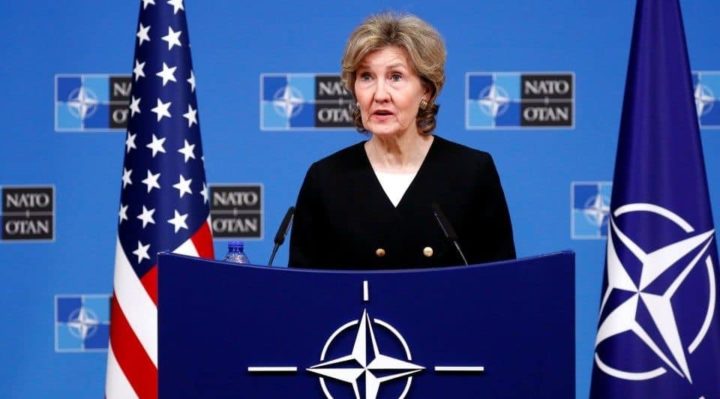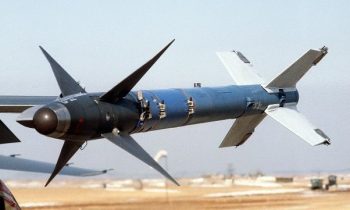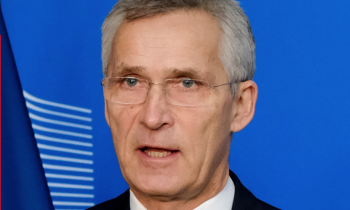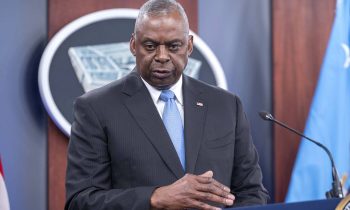Ukraine and Georgia are working closely with NATO and in Washington hope that these countries will be able to become members of the North Atlantic Alliance, U.S. Permanent Representative to NATO Ambassador Kay Bailey Hutchison has told reporters on Monday in Brussels.
“I expect that the message from President Trump will be that the United States is committed to NATO — that NATO is important for our shared security — but at the same that we need a fairer sharing of the burden,” Stoltenberg told reporters in Brussels about the planned talks at the White House.
Below is a full rush transcript of the press conference by Ambassador Kay Bailey Hutchison, U.S. Permanent Representative to NATO.

Ambassador Hutchison: I’m looking forward to having this opportunity to really talk to the press about a great 70th Anniversary that we are having in Washington, DC. We’re going to be at the Mellon Auditorium which is the place where the Washington Treaty was signed almost 70 years ago now.
And this is going to be a historic time. It’s going to be historic, too, because Secretary General Jens Stoltenberg has been invited to speak to a joint session of Congress, the first time the head of a multilateral, multinational organization has had that honor. And I think it is an honor because there is such a strong support both in Congress and in the administration for this important historic alliance and 70 years of peace in Europe and North America because we have a security umbrella. So I think that is the theme of our 70th Anniversary Ministerial, where our Foreign Ministers will meet to talk about the major issues that NATO is facing, not only today but also to talk about our historic successes of the past.
Today we are going to be talking about, of course, our burden sharing and defense investment to make sure that we are strong enough as an alliance to withstand any of the risks or threats that we face today. We do have threats. We have threats from a very more aggressive Russia, most certainly after the attempted annexation of Crimea, Russia has continued to sow maligned influence in the Ukraine.
We also are going to be talking about counterterrorism, something that is very important to all of our countries because we have seen terrorist attacks in many of our countries and we want to prevent terrorist cells from being able to grow anywhere and be imported into any of our alliance or anywhere else in the world, for that matter.
Then we also will be talking about emerging threats. What are we going to be facing in the future? One of the areas that NATO can do is look ahead to make sure that we are not only strengthening our alliance in its unity and capabilities, but also to make sure we’re looking at other areas where there could be a fomenting potential risk for any of us, and we want to be able to assess those risks and take the necessary steps to be strong and allied against any risk in the future.
Question: Mike Pompeo said last week that the NATO Foreign Ministers could announce new measures to counter Russia’s actions in and around Ukraine. Are you working on it? And what kind of measures could they be?
Ambassador Hutchison: Most certainly part of our efforts are going to be looking at how we can shore up the defense in the Black Sea area, and this is caused by Russian aggression on Ukraine. They are continuing to try to destabilize Ukraine. They continue to hold and are militarizing Crimea which is a part of Ukraine. And just most recently capturing ships and taking the sailors from the Ukraine in the Kerch Straits into a Moscow prison is beyond acceptable. It’s not acceptable, and we will be looking at ways to do more in the whole Black Sea region. We will be doing more surveillance, there will be more ships in the Black Sea from NATO countries, and there are sanctions that have already been imposed against the people that have perpetrated the taking of the sailors in the Kerch Straits and calling for an immediate return of those sailors from the Moscow prison back to Ukraine.
Question: Are NATO countries recognizing the progress that Georgia and Ukraine are making towards joining the alliance?
Ambassador Hutchison: Well most certainly we are. We are in partnership with Ukraine and Georgia and I would hope that someday they will be able to be members of NATO. They are people that have reformed their countries, they have a spirit that is so important, and we have a close alliance with Ukraine and Georgia and we will continue to build on that.
Question: Seventy years is still young, isn’t it? Can you comment more on the 70th Anniversary?
Ambassador Hutchison: I think 70 is very young, actually. But it is long in terms of an alliance. It’s the longest standing military alliance really in the history of the world. It has been strong and unified, and that umbrella of security has provided so much prosperity for the European countries that are members and have become members as well as for our North Atlantic region, Canada and the United States.
So together we are able to do so much more than any of us could do alone, and it is because of our NATO Alliance that we have seen a relative peace for 70 years in a continent that was war-torn in the previous century. So I think it’s been a success. It’s been a long success in terms of alliances. And of course going from 12 members to 29 and hopefully going on 30 by the end of this year, we feel that we have a major role in the stabilization of Europe.
Question: When can we expect the U.S. Senate to ratify the NATO Accession Protocol for North Macedonia?
Ambassador Hutchison: Well as you know, getting the parliamentary approvals of 29 countries does take time because every parliament has their own procedures. I expect ours to be in the fall. That’s what we would really like to see. And I think our Congress is very favorable, and I think our Senate will be able to do this. And I think when they hear the story of Macedonia and Northern Macedonia and what they have done to produce the reforms that make them eligible for membership, and also when you see the map and how they connect with other NATO countries already, it will make them stronger, it will make NATO stronger, and I believe that the Senate will act in the fall to agree with that accession.
Question: How can NATO stay committed to certain values while having separatists like Turkey, Poland, and Hungarians in your alliance? They seem to prefer acting outside NATO. Why does NATO need ten times more money than Russia?
Ambassador Hutchison: Most certainly we are stronger in unity, and it isn’t that every country has a smooth pathway. Sometimes, you know, I think we’ve seen the populist movement, for instance, in many of our countries, and I think that has affected some of the reforms in European countries — not in America and not in Canada really, but certainly in some of our European countries there have been differences. But those differences are never putting NATO in jeopardy.
We have the strength of unity, we act unanimously, and I think that is a strength even when some of our countries are in divided governments, they are in divided parties, they have to put together unity for a government which sometimes is fragile. All of these things we have withstood for 70 years and we will see it through again. And it is the strength of our unity which every one of our countries understands, and that is what will keep us together.
Question: Are you concerned by the news that Germany may struggle even to reach the equivalent of 1.5 percent of GDP of military spending by 2024?
Ambassador Hutchison: I think Germany is going to be doing more. I think they will meet their goal and their commitment to 1.5 by 2024. Chancellor Merkel said that to the President just last week in a phone call. And she has recommitted to that.
But in addition, they are going to continue to go toward the 2024 goal of 2 percent. They don’t say that they will make it in 2024 yet, but they are going to continue to that 2 percent goal.
I think that Germany is one of those divided governments that I had mentioned where there’s a coalition put together, and they are trying to go in that right direction I know, and they must. We need more from Germany because they are the strongest economy in Europe. They need to do more. They say they need to do more. So I know that the will is there of Chancellor Merkel and her part of the coalition, and I think she is working to bring others in so that they can have that budget that will give us more of the capabilities that Germany can provide. We need that. We’re asking for it. And they say they will deliver.
Question: I would like to hear your opinion on cooperation generally with Romanian Defense Authorities. Thank you.
Ambassador Hutchison: We have a great relationship with the Romanian Defense Authorities and with the Romanian military. They are very important contributors to our NATO missions. They are in Afghanistan. They are with us in most certainly the tailored forward presence as well as enhanced forward presence. They do their part and we have a great relationship and we will continue to solidify our relations and our military cooperation with Romania.
Question: How do you evaluate the defense cooperation agreement with Hungary? In what way will it help American troops fulfill their obligations to the European mission?
Ambassador Hutchison: Hungary, of course, is one of our important members. We have a great bilateral relationship with Hungary and we are also, they are also part of our NATO missions. They are working toward increasing their defense spending, which is very important, as well. So I look forward to having Hungary in our alliance and being a contributing member of our alliance for the long term.
Question: How are the deliberations that led to the decision to hold the Foreign Affairs Ministerial in DC but the Leader’s Summit in London? What were the factors considered by the Secretary General, and the NAC and why at the end did the allies decide on each separate location for each specific event?
Ambassador Hutchison: Well, we wanted to have a major celebration in Washington on the 70th Anniversary, and because we had the summit less than a year ago we felt that the Foreign Ministerial was the right timing for the 70th Anniversary. The treaty was signed on April 4th, but it was too soon for a heads of state meeting. That’s why London stepped up and offered for us to have the heads of state meeting later this year, probably December is my guess. And that leaves more time for us to have more for the heads of state to discuss and move us forward.
In addition, London was actually the first headquarters of NATO after the treaty was signed. So it was important for them to celebrate the 70th Anniversary when they were the first headquarters. And we wanted it to be there as well. And of course you have to be invited to come to a ministerial or a heads of state meeting because it’s a big effort on the part of a host country. So having a country that is willing to have you, as well as the timing be right for the ministerials and the heads of state conferences is all a factor in deciding.
Question: German sources always claim that the low increase in Germany’s defense spending isn’t a big issue within NATO. Can you confirm that?
Ambassador Hutchison: Well it’s a big issue in NATO because we made a commitment for 2 percent. Every country signed onto that that is a member. And it was recommitted in the Brussels Summit just last July. So of course we need every country to step up in their own capabilities, and Germany does meet their capability targets, which is the equipment that we ask for them to have for our umbrella, but they don’t contribute the 2 percent that we need in the overall defense spending and that’s what we need for them to do because we know that they’re such a strong economy, and we want their leadership to be felt on the security side as well as the economic side.
Ambassador Hutchison: Well let me just say thank you for the interest in our 70th Anniversary. We’re all looking forward to going to Washington, and we are looking forward in Washington to welcoming our 29 NATO Ambassadors. There are going to be several events where the bilateral ambassadors, the diplomatic corps in Washington which is invited to so many of our government functions, they are also invited to the joint session of Congress where Secretary Stoltenberg is going to be speaking.
But we also have events and receptions for the NATO Ambassadors as well as the Foreign Ministers who are going to be in Washington, as well. So there’s going to be a big presence this week for our 70th Anniversary among our Foreign Ministers and the Ambassadors in celebrating our security umbrella which has provided not only security but the security that provides prosperity for our NATO Alliance.



